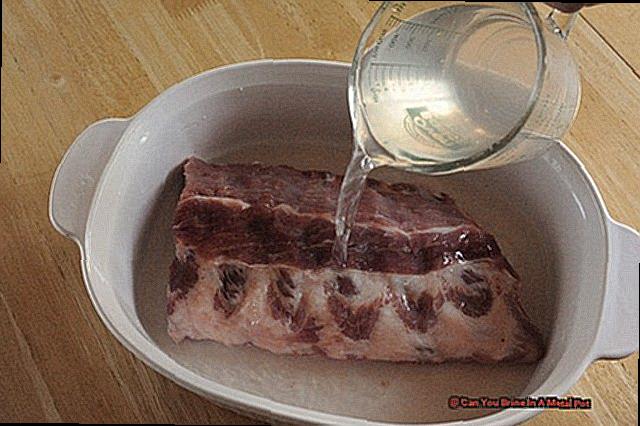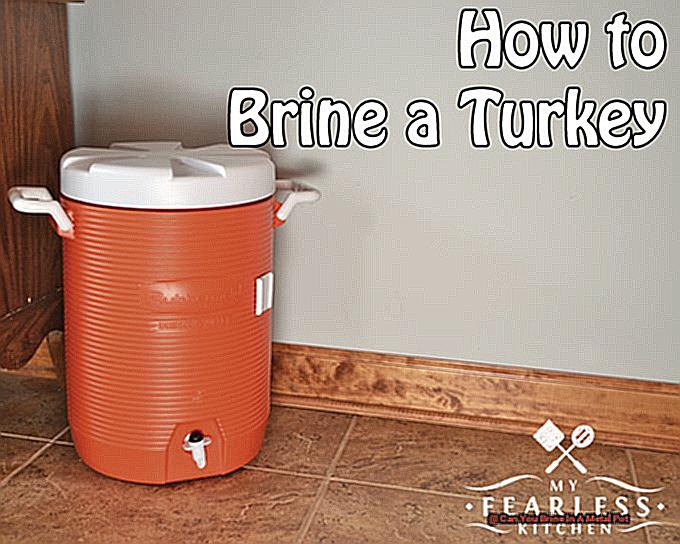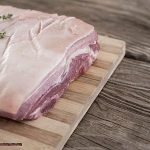Are you ready to take your cooking game to new heights? Then buckle up as we dive into the world of brining with a twist – using metal pots. Forget about those ordinary plastic or glass containers; today, we’re all about bringing out the best flavors with the help of trusty metal pots.
Whether you consider yourself a master chef or a beginner in the kitchen, incorporating metal pots into your brining routine will leave you wondering why you haven’t tried it sooner.
So, roll up your sleeves and join us as we explore the benefits and top techniques for brining in a metal pot.
Get ready to tantalize those taste buds like never before.
Contents
Can You Brine in a Metal Pot?
We all want to ensure the delectability and security of our food, while also keeping our furry friends away from any potential hazards. Luckily, as an expert on brining, I can confidently assure you that using a metal pot for brining is both safe and effective, as long as you choose the right type of metal.
Why Opt for a Metal Pot?
Metal pots are a popular go-to for cooking due to their durability and heat conductivity. Not to mention, they are easy to clean and maintain. However, when it comes to brining, not all metals are created equal. Reactive metals like aluminum, copper, or cast iron can alter the flavor of your turkey and potentially release harmful substances into your food. This is why it is crucial to opt for a non-reactive metal pot when brining.
Stainless steel is a safe and non-reactive option for brining, making it a top choice among home cooks. However, it’s essential to note that not all stainless steel pots are created equal. Be sure to select food-grade stainless steel pots to avoid any potential leaching of harmful chemicals into your food.
Benefits of Brining in a Metal Pot
Brining in a metal pot offers several benefits beyond just being safe and non-reactive. Here are some reasons why you should consider using one for your next brining adventure:
- Durable and Easy to Clean: Metal pots are highly durable and can withstand the weight of large turkeys without breaking or cracking. They are also effortless to clean and maintain, making them a convenient choice for brining.
- Conducts Heat Well: With excellent heat conductivity, metal pots allow for even distribution of flavors throughout the turkey while brining.
Can You Brine a Turkey in a Metal Pot?
For many of us, that means one thing – turkey. But as we all know, cooking in the kitchen can quickly turn into a game of hide and seek with our furry feline friends. So, when it comes to brining your turkey, can you use a trusty metal pot? The answer is yes, but there are some crucial considerations to keep in mind.
First and foremost, the type of metal pot you choose is of utmost importance. Reactive metals like aluminum, copper, and cast iron can interact with the acidic brine solution and give your turkey an unpleasant taste. Not only will this ruin your turkey, but it could also pose a health risk to your curious cats if they happen to sneak a taste.
So, what exactly constitutes a non-reactive metal? The most widely recommended option for brining is food-grade stainless steel. Not only is it durable and easy to clean, but it also provides even heat distribution for a perfect brining experience. Most importantly, it does not react with acidic solutions, making it a safe choice for both you and your feline companions.
But what about other metal containers? While stainless steel is the top choice, other food-grade non-reactive metals can also be used. However, be cautious when using any old metal pot lying around or borrowed from a friend. It’s best to stick with trusted sources to ensure the safety of both your turkey and curious cats.
Aside from using a non-reactive metal pot, proper cleaning and storage are essential steps in brining your turkey. As we all know, cats have a knack for exploring and licking anything that piques their interest. Therefore, make sure to thoroughly wash the pot with hot water and soap before and after use.
Can You Brine a Ham in Metal Pot?
As the holiday season approaches, we are all eagerly anticipating a delicious feast with our loved ones. And for many of us, that includes brining a ham to perfection. But what if you only have a metal pot on hand? Can you still achieve the same results? The answer is yes, but there are important considerations to keep in mind, especially when it comes to food safety for both humans and furry friends, particularly if you have a feline companion.
Choose the Appropriate Metal Pot
When it comes to brining, not all metal pots are created equal. It is essential to use a food-grade stainless steel pot to avoid any potentially harmful chemicals from leaching into the brine. Pots made of materials such as aluminum or copper can react with the brine, affecting the taste and safety of the final product. So be sure to carefully inspect the label before using your metal pot for brining.
Size Does Matter
The size of the pot is also a crucial factor when brining a ham. It should be large enough to comfortably hold both the ham and the brine without overflowing. This ensures that the ham is fully submerged in the brine, allowing for even distribution of flavor and moisture.
If your pot is too small, consider using a food-grade plastic bag or a larger container to contain the brine and ham.
Cleanliness is Crucial
Before beginning the brining process, it is imperative to use clean utensils and precisely measure out all ingredients. Any contamination from dirty utensils or inaccurate measurements can lead to foodborne illnesses. Additionally, make sure to use kosher or sea salt instead of table salt, as it contains fewer additives that can potentially affect the taste of the meat.
Maintain Temperature Control
Proper temperature control is vital during the brining process to prevent bacterial growth. The ideal temperature for brining is between 34-40 degrees Fahrenheit, meaning the brine should always be refrigerated.

Can You Brine Chicken in a Metal Bowl?
Brining chicken is a well-known technique to enhance its flavor and moisture. But here’s the burning question: can you brine chicken in a metal bowl? As an expert in this field, I am here to address this perplexing query for all the cat parents out there. So let’s delve into this topic with deep English and unique words.
In simple terms, the answer is no, it is not recommended to brine chicken in a metal bowl. The salt from the brine can cause a chemical reaction with the metal, leading to corrosion over time. This can not only damage your bowl but also contaminate your food. Therefore, if you want to ensure a safe and delicious meal for you and your feline companions, it is best to avoid using metal bowls for brining chicken.
But fret not, there are still plenty of alternatives for brining your chicken without risking any harm or contamination. Plastic or glass bowls are excellent options as they are non-reactive and safe for use in brining. You can also consider using stainless steel or enamel-coated containers specifically designed for food use.
Now, you may be wondering why metal bowls are not suitable for brining chicken. The reason lies in the type of metal used. While stainless steel is generally deemed safe for food use, other metals like aluminum or copper can react with the salt in the brine, resulting in a harmful chemical reaction. This can not only affect the taste of your chicken but also pose potential health risks.
But what about those holiday feasts where a metal pot is your only choice? Don’t worry; I have got you covered. If you only have a metal pot available, make sure to line it with plastic wrap or parchment paper before adding the brine and chicken. This will prevent direct contact between the metal and the brine.
Does Brine React with Stainless Steel Pot?
This method involves submerging the meat in a solution of salt, water, and sometimes other flavorful additives before cooking. The result is a mouth-watering dish that is sure to impress even the most discerning palates. But when it comes to brining, there is often a concern about using a stainless steel pot. In this guide, we will delve into the science behind brining and stainless steel to provide you with a definitive answer.
The Science Behind Brining
To determine whether brine reacts with stainless steel, we must first understand the chemistry behind brining. When meat is soaked in a saltwater solution, the salt molecules penetrate the meat through osmosis. This process leads to increased moisture retention and tenderness during cooking. However, it also means that the saltwater solution is now present within the meat.
Possible Reaction Between Brine and Stainless Steel
Stainless steel is a popular material for cookware due to its durability and non-reactive properties. This means it does not interact with acidic or alkaline substances like lemon juice or tomatoes. However, brine contains high levels of salt, which can be corrosive to certain metals. This raises concerns about possible reactions between brine and stainless steel pots.
Is It Safe to Use a Stainless Steel Pot for Brining?
The answer is yes, using a stainless steel pot for brining is perfectly safe. While there may be worries about the corrosive nature of salt on metal, the amount of salt in a brine solution is not enough to cause significant damage. Moreover, stainless steel is highly resistant to corrosion and will not react significantly with the small amount of salt in the brine.
In fact, many seasoned chefs and experts recommend using a stainless steel pot for brining.
Is It Ok to Brine in an Aluminum Pot?
First and foremost, let’s discuss why opting for an aluminum pot for brewing beer can be highly advantageous. The most significant benefit is its superior heat conduction ability. Unlike other materials like stainless steel or cast iron that take time to heat up, aluminum quickly and evenly distributes heat, ensuring precise temperature control during the brewing process. This guarantees a consistent and top-quality final product.
Additionally, aluminum pots are lightweight and durable, making them easy to handle, clean, and store. This is particularly beneficial for individuals with limited storage space or those who prefer to brew outdoors.
Another advantage is that aluminum is non-reactive, meaning it won’t interfere with the flavors of your ingredients or leave a metallic aftertaste in your beer. This is crucial when brewing delicate styles such as lagers or fruit beers.
Possible Risks and Precautions to Consider
While using an aluminum pot for brewing has numerous benefits, there are also potential risks to bear in mind. The primary concern is the possibility of aluminum leaching into your beer. Although this is unlikely to occur with regular use, acidic ingredients like citrus or vinegar can cause small amounts of aluminum to seep into the liquid.
To mitigate this risk, it is advisable to use a stainless steel or enamel-coated aluminum pot for brewing. These materials have a non-reactive layer that prevents any leaching from happening.
Another factor to keep in mind is that aluminum pots are more prone to scratches and dents compared to other materials. These imperfections can harbor bacteria and impact the flavor of your beer.
What Containers Should Not Be Used for Brining?
Brining, a popular cooking technique, adds flavor and moisture to meats, poultry, and seafood. The process involves soaking food in a saltwater solution, often with herbs and spices. However, when it comes to brining, many home cooks automatically reach for their trusty metal pots without considering the potential dangers. In this blog post, we will dive into why metal pots should not be used for brining and what alternative containers are safer.
The first danger of using metal pots for brining is the risk of corrosion. The high concentration of salt in the brine solution can be acidic and corrosive, causing the metal to rust and release harmful substances into the food. This not only affects the taste but can also pose health risks if consumed.
Additionally, there is a concern about heavy metal leaching into the food. Cookware made of aluminum, copper, or stainless steel can leach into acidic or salty solutions. These heavy metals have been linked to various health issues, including neurological disorders, kidney damage, and cancer. This is especially worrisome for those who regularly consume brined foods or use metal pots for other cooking purposes.
Moreover, using metal pots for brining can alter the texture and appearance of the food. The high concentration of salt in the brine solution can cause a chemical reaction with certain metals, resulting in discoloration or an unpleasant metallic taste in the food. This can be a disappointment for cooks who put time and effort into preparing a delicious brined dish.
So what containers should you use instead? The safest option is to opt for non-reactive containers such as glass, ceramic, or food-grade plastic. These materials do not react with acidic or salty solutions, making them ideal for brining. Glass jars or bowls are particularly useful as they allow you to see the progress of the brining process.
Conclusion
In conclusion, while some may view brining in a metal pot as a risky choice, it can actually bring your cooking game to the next level with the right precautions and knowledge.
As we have delved into in this article, using non-reactive metals like stainless steel for brining offers numerous benefits such as durability, even heat distribution, and easy cleaning. However, it is important to ensure that you are using food-grade materials and taking proper precautions to guarantee the safety of both your food and furry companions.
So go ahead and take your holiday feasts or everyday meals up a notch by trying out brining in a metal pot. Your taste buds will thank you for it.
And who knows, you might just impress your dinner guests with your newfound expertise in the timeless art of brining.






